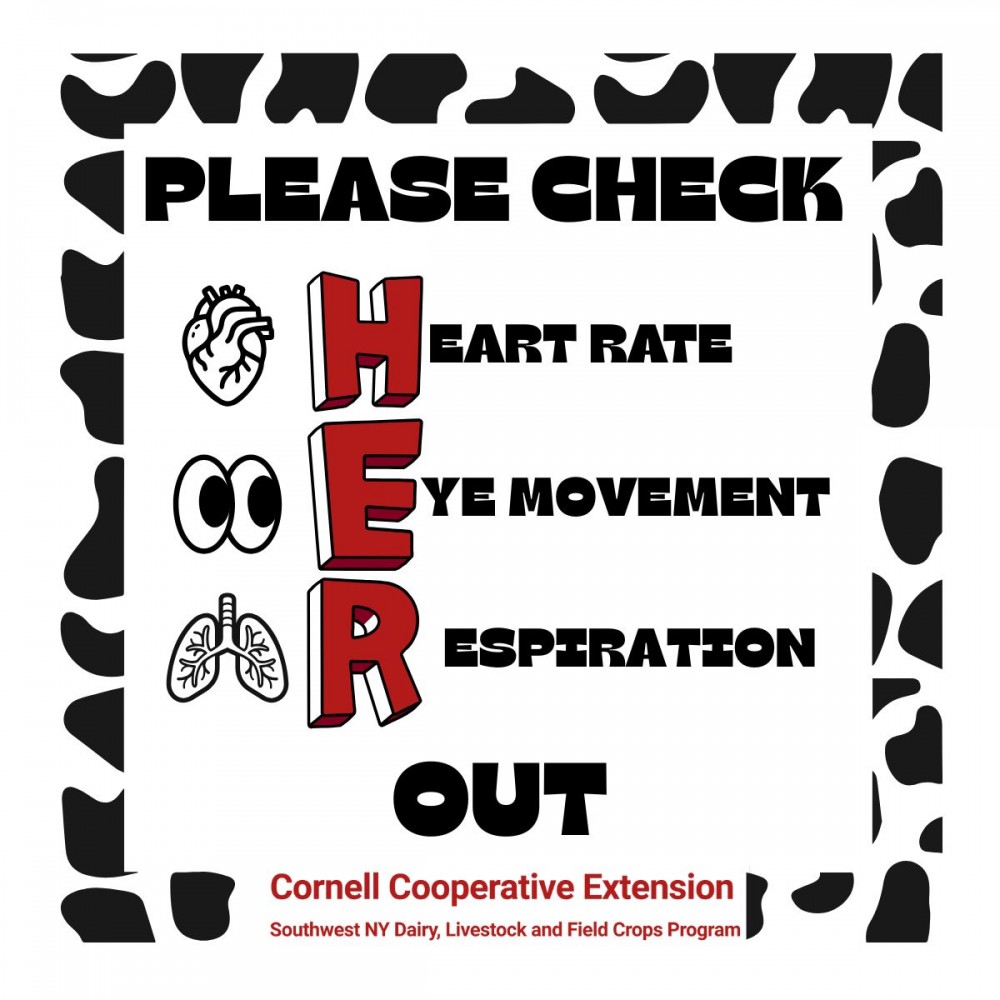Please Check H.E.R. Out: Ensuring a Compassionate End of Life
Katie Callero, Dairy Management Specialist
Southwest New York Dairy, Livestock and Field Crops Program
As one of my colleagues, Kirsten Workman from Pro-Dairy, frequently says, "If you're going to have livestock, you're going to have deadstock." This is just the reality of farming animals. The very serious responsibility gifted to livestock farmers is to ensure that the end of life is humane and compassionate. Dr. Jennifer Walker of Kinder Ground, an organization that aims to elevate the welfare of food production animals, stated three basic ground rules for euthanasia consideration in cattle. The first is: Death is NOT a welfare issue, DYING is. No animal should have to experience prolonged suffering as they endure the process of dying. She mentioned an adage that sticks in her mind as a veterinarian when she is questioning a euthanasia decision, which is "better a day early, than a moment too late." The second ground rule is: Transport is a hard process regardless. It can be easy to get sucked into the delusion that once a cow is loaded onto the truck, she is done and gone. While she may no longer be under your direct supervision, transport can be an arduous process, and it is not an uncommon occurrence for cows to travel long distances and often end up out of state from their originating farm. If you are thinking you want a cow gone on the truck tomorrow, it may be the most compassionate thing to euthanize her today as you seriously investigate her fitness for transport. The final ground rule laid out by Dr. Walker is: Profit is NOT a justification for suffering. The emphasis here is on making better decisions sooner and not letting a cow who is still producing some milk blind you to the best welfare decision.
Every farm should have clear and established euthanasia protocols. I find decision tree resources to be incredibly helpful in ensuring consistent decisions throughout all the farm staff. Once the decision has been made there are three approved methods by the FARM program for euthanasia: gunshot (no secondary step required), captive bolt (secondary step required), intravenous injection (performed by a veterinarian). It is imperative that all staff are trained on your method of choice and are continually reeducating themselves. Unfortunately, many of us have probably heard the horror stories of what happens when untrained farm staff try to offer compassion to a suffering animal only to make matters worse. Stories like these are why I join in agreement with Dr. Jennifer Walker when she urges farmers to please always check H.E.R. out. This nifty acronym reminds you that you need to check for H - heart rate, E - eye movement, and R - respiration to ensure euthanasia has been performed properly. If you would like help reviewing or creating your euthanasia protocols or want posters or other resources for your farm regarding euthanasia, please reach out to me, Katie Callero, at 607-422-6788.
Finally, not only do you need to ensure you check H.E.R. out but you should also check yourself out. There is an emotional toll that accompanies the moral responsibility that is associated with making these decisions. Be compassionate with yourself, especially in seasons where it seems these decisions may be occurring more frequently than they need to be. Be honest with yourself and your farm staff. Spend time with those you love and remind yourself of your "Why?" for farming livestock, whatever it may be. Ultimately, every day you are feeding not just your cows, but your community and our country. If you are ever looking for extra support, there are a myriad of resources available. You can reach out to NY FarmNet for free confidential assistance: 1-800-547-3276. Browse the resources from Rural Minds at ruralminds.org. Call or text the 988 lifeline number. You can also reach out to your local county offices: Allegany - 585-593-1991, Cattaraugus - 716-373-8040, Chautauqua - 716-753-4104, Erie - 716-248-2941, and Steuben - 607-664-2255.

Upcoming Events
Boots in the Barn: Cornell Dairy Research Updates
January 13, 2026
January 20, 2026
January 27, 2026
February 3, 2026
February 10, 2026
February 17, 2026
February 24, 2026
Join us for some or all!
Webinar: Converting Old Dairy Barns into swine Facilities
January 21, 2026 : Webinar: Converting Old Dairy Barns into swine Facilities
Tim Terry, Farm Strategic Planning Specialist with Cornell's Pro-Dairy program will share information on what it takes to transition an old dairy barn for swine production. We plan to cover flooring, ventilation, and lighting, considerations for system workability, and more! Registration is free.
Southern Tier Crop Congress
January 28, 2026 : Southern Tier Crop Congress
Belfast, NY
Join SWNYDLFC and CCE Allegany County for the upcoming Southern Tier Crop Congress. CCA and DEC credits are available!
Announcements
Cows, Crops & Critters Newsletter Sponsorship
TRYING TO REACH GROWERS AND AGRIBUSINESSES IN OUR SOUTHWEST REGION OF NEW YORK?Weekly Email Update: Shared with 625+ households who have signed up with our program.
Monthly Paper Mailer: To reach our stakeholders and farmers who lack internet access, we send out a monthly mailer where your company's logo and contact information would be featured with a mailing list of 330+ households.
If you sponsor our weekly and monthly publications you reach approximately 955 households.





